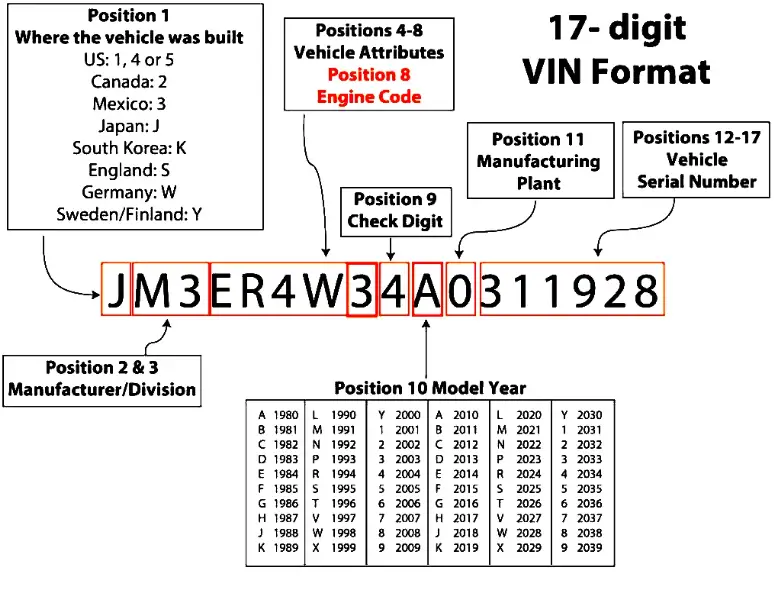Car history by VIN reveals key details like accident history, ownership, and title status. Decoding the VIN helps you make informed decisions when buying or selling a vehicle.
Every vehicle carries a unique identifier known as the Vehicle Identification Number (VIN). This 17-character code is more than just a registration tool; it’s a detailed record keeper of your car’s entire history. By decoding and analyzing the information embedded in the VIN, you can uncover crucial details about your vehicle’s origin, specifications, and any incidents it may have been involved in.
In this guide, we’ll delve into the significance of the VIN, how to decode it, what information it reveals, and how to obtain a comprehensive vehicle history report. Whether you’re considering purchasing a used car or simply curious about your own vehicle’s background, understanding the VIN is an essential step.

Contents
What Is a VIN?
A Vehicle Identification Number (VIN) is a unique 17-character alphanumeric code assigned to every motor vehicle when it’s manufactured. Think of it as the car’s fingerprint—no two vehicles have the same VIN. This code serves multiple purposes, including registration, insurance, and tracking of the vehicle’s history.
Structure of a VIN
The VIN is divided into several sections, each providing specific information:
- Characters 1–3: World Manufacturer Identifier (WMI) – indicates the manufacturer and country of origin.
- Characters 4–8: Vehicle Descriptor Section (VDS) – details the model, body style, engine type, and other features.
- Character 9: Check digit – used to verify the validity of the VIN.
- Character 10: Model year – indicates the vehicle’s model year.
- Character 11: Assembly plant – shows where the vehicle was manufactured.
- Characters 12–17: Vehicle Identifier Section (VIS) – a unique serial number assigned to the vehicle.
How to Decode a VIN
Decoding a VIN can provide a wealth of information about a vehicle. Several online tools and resources are available to assist with this:
- National Highway Traffic Safety Administration (NHTSA): Offers a free VIN decoder that provides basic information about a vehicle’s make, model, and specifications.
- Carfax: Provides detailed vehicle history reports, including accident history, service records, and more.
- VINCheck.info: Offers free VIN checks that include information on title records, accidents, and more.
By entering the VIN into one of these tools, you can uncover detailed information about the vehicle’s history and specifications.
What Information Can You Obtain from a VIN?
A VIN can reveal a multitude of details about a vehicle, including:
- Manufacturer Details: Identifies the company that produced the vehicle.
- Vehicle Specifications: Provides information on the model, body style, engine type, and more.
- Title and Registration Records: Shows the vehicle’s title status and registration history.
- Accident and Damage History: Indicates if the vehicle has been involved in any accidents or sustained significant damage.
- Odometer Readings: Helps verify the accuracy of the vehicle’s mileage.
- Service and Maintenance Records: Lists any service or maintenance performed on the vehicle.
- Recall Information: Shows any outstanding recalls on the vehicle.
This information is invaluable when buying or selling a vehicle, as it provides transparency and helps ensure you’re making an informed decision.
Why Is Checking a Vehicle’s History Important?
Obtaining a vehicle history report is crucial for several reasons:
- Avoiding Fraud: Helps detect odometer fraud, title washing, and other deceptive practices.
- Assessing Value: Provides insight into the car’s market value and potential depreciation.
- Ensuring Safety: Reveals any past accidents or damages that could affect the vehicle’s safety.
- Legal Protection: Ensures the vehicle has a clean title and is not subject to any legal disputes.
By reviewing a vehicle’s history, you can make a more informed decision and avoid potential pitfalls.

How to Obtain a Vehicle History Report
There are several reputable services where you can obtain a detailed vehicle history report:
- Carfax: Offers comprehensive reports that include accident history, service records, and more.
- AutoCheck: Provides detailed vehicle history reports with a focus on auction data.
- VINCheck.info: Offers free VIN checks that include information on title records, accidents, and more.
- VehicleHistoryReport.com: Provides free vehicle history reports with details on title status, accidents, and more.
To obtain a report, simply enter the vehicle’s 17-character VIN into the chosen service’s search tool. Most services offer instant access to the report, often for a fee, though some provide basic information for free.
Common Red Flags to Watch For
When reviewing a vehicle history report, be on the lookout for the following red flags:
- Salvage or Rebuilt Titles: Indicates the vehicle has been declared a total loss by an insurance company and subsequently rebuilt.
- Odometer Rollbacks: Suggests the vehicle’s mileage has been tampered with.
- Frequent Ownership Changes: Could indicate potential issues with the vehicle or its title.
- Unresolved Recalls: Shows that the vehicle has outstanding safety recalls that have not been addressed.
- Accident History: Reveals if the vehicle has been involved in significant accidents that may affect its safety or value.
Identifying these issues early can save you from costly repairs or legal complications down the road.
Frequently Asked Questions
Here are some FAQs about car history by vin –
1. How can I find my vehicle’s VIN?
The VIN is typically located on the driver’s side dashboard, near the windshield, or inside the driver’s side door frame, on the doorpost or doorjamb.
2. Can I get a free vehicle history report?
Some services offer basic information for free, but comprehensive reports usually require a fee.
3. What if the VIN doesn’t match the vehicle’s details?
A mismatch could indicate potential fraud or misrepresentation. It’s advisable to verify the information with the seller and consider contacting the authorities.
4. Are vehicle history reports 100% accurate?
While these reports are based on available data, they may not capture every detail, especially if incidents were not reported or recorded.
5. Can I use a VIN to check if a car has been stolen?
Yes, some services provide information on whether a vehicle has been reported as stolen.
Related Article
Towing Capacity by VIN
Paint Code by VIN Number
Window Sticker by VIN
Conclusion
Identying a vehicle’s history through its VIN is an essential step in making informed decisions about buying or selling a car. By decoding the VIN and obtaining a comprehensive vehicle history report, you can uncover vital information about the vehicle’s past, including any accidents, title issues, or service records. This knowledge empowers you to make confident choices, ensuring safety, value, and peace of mind